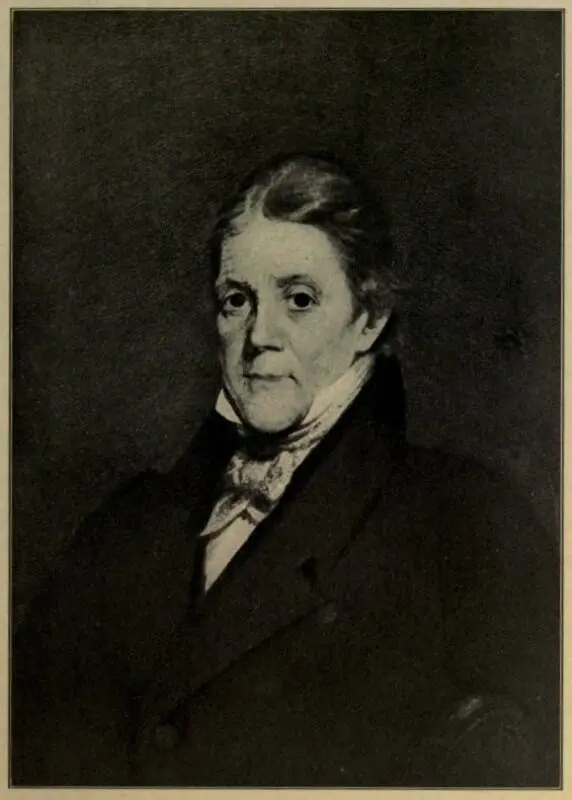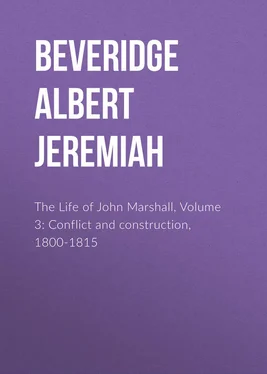Albert Beveridge - The Life of John Marshall, Volume 3 - Conflict and construction, 1800-1815
Здесь есть возможность читать онлайн «Albert Beveridge - The Life of John Marshall, Volume 3 - Conflict and construction, 1800-1815» — ознакомительный отрывок электронной книги совершенно бесплатно, а после прочтения отрывка купить полную версию. В некоторых случаях можно слушать аудио, скачать через торрент в формате fb2 и присутствует краткое содержание. Жанр: foreign_prose, foreign_antique, Биографии и Мемуары, foreign_language, на английском языке. Описание произведения, (предисловие) а так же отзывы посетителей доступны на портале библиотеки ЛибКат.
- Название:The Life of John Marshall, Volume 3: Conflict and construction, 1800-1815
- Автор:
- Жанр:
- Год:неизвестен
- ISBN:нет данных
- Рейтинг книги:4 / 5. Голосов: 1
-
Избранное:Добавить в избранное
- Отзывы:
-
Ваша оценка:
- 80
- 1
- 2
- 3
- 4
- 5
The Life of John Marshall, Volume 3: Conflict and construction, 1800-1815: краткое содержание, описание и аннотация
Предлагаем к чтению аннотацию, описание, краткое содержание или предисловие (зависит от того, что написал сам автор книги «The Life of John Marshall, Volume 3: Conflict and construction, 1800-1815»). Если вы не нашли необходимую информацию о книге — напишите в комментариях, мы постараемся отыскать её.
The Life of John Marshall, Volume 3: Conflict and construction, 1800-1815 — читать онлайн ознакомительный отрывок
Ниже представлен текст книги, разбитый по страницам. Система сохранения места последней прочитанной страницы, позволяет с удобством читать онлайн бесплатно книгу «The Life of John Marshall, Volume 3: Conflict and construction, 1800-1815», без необходимости каждый раз заново искать на чём Вы остановились. Поставьте закладку, и сможете в любой момент перейти на страницу, на которой закончили чтение.
Интервал:
Закладка:
Burr's stepson, his brother-in-law, his most intimate friend, were forthwith appointed to the three most valuable and commanding offices in the new government of the Louisiana Territory, at the attractive city of New Orleans. 501The members of the Cabinet became attentive to Burr. The President himself exercised his personal charm upon the fallen politician. Time after time Burr was now invited to dine with Jefferson at the Executive Mansion.
Nor were Presidential dinners, the bestowal of patronage hitherto offensively refused, and attentions of the Cabinet, the limit of the efforts to win the coöperation of the man who was to preside over the trial of Samuel Chase. Senator Giles drew a petition to the Governor of New Jersey begging that the prosecution of Burr for murder be dropped, and to this paper he secured the signature of nearly all the Republican Senators. 502
Burr accepted these advances with grave and reserved dignity; but he understood the purpose that inspired them, did not commit himself, and remained uninfluenced and impartial. Throughout the momentous trial the Vice-President was a model presiding officer. "He conducted with the dignity and impartiality of an angel, but with the rigor of a devil," records a Washington newspaper that was bitterly hostile to Burr personally and politically. 503
When Chase took his place in the box, the Sergeant-at-Arms brought him a chair; but Burr, adhering to the English custom, which required prisoners to stand when on trial in court, ordered it to be taken away. 504Upon the request of the elderly Justice, however, Burr quickly relented and the desired seat was provided. 505
Chase was, in appearance, the opposite of the diminutive and graceful Vice-President. More than six feet tall, with thick, broad, burly shoulders, he was a picture of rugged and powerful physical manhood, marred by an accumulation of fat which his generous manner of living had produced. Also he was afflicted with an agonizing gout, with which it seems so many of "the fathers" were cursed. His face was broad and massive, his complexion a brownish red. 506"Bacon face" was a nickname applied to him by the Maryland bar. 507His head was large, his brow wide, and his hair was thick and white with the snows of his sixty-four winters. 508
The counsel that surrounded the impeached Justice were brilliant and learned. 509They were Joseph Hopkinson, who six years before, upon Marshall's return from France, had written "Hail Columbia; or, The President's March"; Philip Barton Key, brother of the author of "The Star-Spangled Banner"; 510Robert Goodloe Harper, one of the Federalist leaders in Congress during the ascendancy of that party; and Charles Lee, Attorney-General under President Adams when Marshall was Secretary of State, and one of Marshall's most devoted friends. 511
But in the chair next to Chase sat a man who, single-handed and alone, was more than a match for all the managers of the House put together. Luther Martin of Maryland – of medium height, broad-shouldered, near-sighted, absent-minded, shabbily attired, harsh of voice, now sixty-one years old, with gray hair beginning to grow thin and a face crimsoned by the brandy which he continually imbibed – was the dominating figure of this historic contest. 512
Weary and harried as he was, Randolph opened the trial with a speech of some skill. He contrasted the conduct of Chase in the trial of Callender with that of Marshall in a trial in Richmond in 1804 at which Marshall had presided. "Sir," said Randolph, "in the famous case of Logwood, 513whereat the Chief Justice of the United States presided, I was present, being one of the grand jury who found a true bill against him… The government was as deeply interested in arresting the career of this dangerous and atrocious criminal, who had aimed his blow against the property of every man in society, as it could be in bringing to punishment a weak and worthless scribbler [Callender]."
But how had Marshall acted in the conduct of that trial? "Although," continued Randolph, "much testimony was offered by the prisoner, which did by no means go to his entire exculpation, although much of that testimony was of a very questionable nature, none of it was declared inadmissable ." Marshall suffered it "to go to the jury, who were left to judge of its weight and credibility"; nor had he required "any interrogatories to the witnesses … to be reduced to writing," – such a thing never had been done in Virginia before the tyrannical ruling of Chase in the trial of Callender.
"No, Sir!" he cried. "The enlightened man who presided in Logwood's case knew that, although the basest and vilest of criminals, he was entitled to justice , equally with the most honorable member of society." Marshall "did not avail himself of the previous and great discoveries in criminal law, of this respondent [Chase]"; Marshall "admitted the prisoner's testimony to go to the jury"; Marshall "never thought it his right or his duty to require questions to be reduced to writing"; Marshall "gave the accused a fair trial according to law and usage, without any innovation or departure from the established rules of criminal jurisprudence in his country."

JOHN RANDOLPH
Marshall's gentle manner and large-minded, soft-spoken rulings as a trial judge were thus adroitly made to serve as an argument for the condemnation of his associate, and for his own undoing if Chase should be convicted. Randolph denounced "the monstrous pretension that an act to be impeachable must be indictable. Where? In the Federal Courts? There, not even robbery and murder are indictable."
A judge could not, under the National law, be indicted for conducting a National court while drunk, and perhaps not in all State courts. "It is indictable nowhere for him to omit to do his duty, to refuse to hold a court. But who can doubt that both are impeachable offenses, and ought to subject the offender to removal from office?"
The autocrat of Congress then boldly announced to the Republican Senators that the House managers "confidently expect on his [Chase's] conviction… We shall bring forward … such a specimen of judicial tyranny, as, I trust in God, will never be again exhibited in our country." 514
Fifty-two witnesses were examined. It was established that, in the trial of Fries, Chase had written the opinion of the court upon the law before the jury was sworn, solely in order to save time; had withdrawn the paper and destroyed it when he found Fries's counsel resented the court's precipitate action; and, finally, had repeatedly urged them to proceed with the defense without restriction. Chase's inquisitorial conduct in Delaware was proved, and several witnesses testified to the matter and manner of his charge to the Baltimore grand jury. 515
Every incident in the trial of Callender 516was described by numerous witnesses. 517George Hay, who had been the most aggressive of Callender's counsel, was so anxious to help the managers that he made a bad impression on the Senate by his eagerness. 518It developed that the whole attitude of Chase had been one of sarcastic contempt; and that Callender's counsel were more piqued by the laughter of the spectators which the witty sallies and humorous manner of the Justice excited, than they were outraged by any violence on Chase's part, or even by what they considered the illegal and oppressive nature of his rulings.
When, in defending Callender, Hay had insisted upon "a literal recital of the parts [of The Prospect Before Us ] charged as libellous," Chase, looking around the court-room, said with an ironical smile: "It is contended … that the book ought to be copied verbatim et literatim , I wonder, … that they do not contend for punctuatim too." 519The audience laughed. Chase's interruption of Wirt 520by calling the young lawyer's "syllogistical" conclusion a " non sequitur , sir," was accompanied by an inimitable "bow" that greatly amused the listeners.
Читать дальшеИнтервал:
Закладка:
Похожие книги на «The Life of John Marshall, Volume 3: Conflict and construction, 1800-1815»
Представляем Вашему вниманию похожие книги на «The Life of John Marshall, Volume 3: Conflict and construction, 1800-1815» списком для выбора. Мы отобрали схожую по названию и смыслу литературу в надежде предоставить читателям больше вариантов отыскать новые, интересные, ещё непрочитанные произведения.
Обсуждение, отзывы о книге «The Life of John Marshall, Volume 3: Conflict and construction, 1800-1815» и просто собственные мнения читателей. Оставьте ваши комментарии, напишите, что Вы думаете о произведении, его смысле или главных героях. Укажите что конкретно понравилось, а что нет, и почему Вы так считаете.












